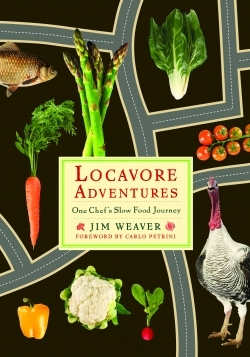Locavore Adventures
One Chef's Slow Food Journey
Early in his story, Jim Weaver explains how discovering the Slow Food movement was his “aha moment,” the point he found his professional purpose as well as the reason for this book: to bring good, local, and fair food to people who love to eat. Since then, and in concert with others in his state of New Jersey and elsewhere, he has become an expert on humanely raised meat, Jersey tomatoes, and artisanal ice cream made with seasonal herbs, among other delicacies.
This foodie’s memoir is an adventure in the sense that he takes us on a spirited tour through the pleasures of sourcing the best available local ingredients by tasting several dozen local cheeses and eating fresh oysters on the beach where they were harvested. Weaver writes with gusto about the importance of “conviviality,” which is central both to the movement’s mission to return eaters to the table “as a source of pleasure” and seems to be his own deepest motivation as a chef and writer. Throughout the narrative, he employs an appealing combination of historical anecdote and personal testimony to bring readers on his pilgrimages to meet the personalities and foodstuffs that have won his heart and changed his game as a chef and owner of an Italian restaurant in Princeton, New Jersey. With him, we taste Delaware Bay oysters and learn why they were eventually added to Slow Food USA’s Ark, which seeks to foster the endangered foods that comprise our American food heritage. He shares the many colors and tastes of salumi at a family shop in Manhattan, where the time-consuming, salt-curing process of mostly pork products yields a delicacy that dates to ancient Rome.
Weaver reminds readers that great food need not come only from expensive restaurants, but that having fun in one’s own kitchen is a value within the Slow Food ethos—and ends his evangilism with an interesting selection of recipes for the home cook.
Jim Weaver has written a book for anyone who has ever wondered about the growing trend toward local and sustainable food but who is not already immersed in the culture. He is the kind of crusader who will bring others to his cause because of his childlike delight at the remarkable items in his food shed rather than his trenchant arguments, although he is plenty persuasive. Whereas much of what we hear about the food system and the American diet is disheartening, Weaver’s account inspires hope. By combining big ideas for how to extend this already thriving movement with his smarts as a business man, his book should inspire many to join him in this cause.
Reviewed by
Holly Wren Spaulding
Disclosure: This article is not an endorsement, but a review. The publisher of this book provided free copies of the book to have their book reviewed by a professional reviewer. No fee was paid by the publisher for this review. Foreword Reviews only recommends books that we love. Foreword Magazine, Inc. is disclosing this in accordance with the Federal Trade Commission’s 16 CFR, Part 255.

